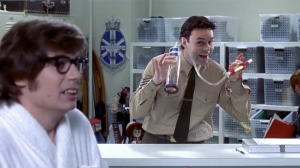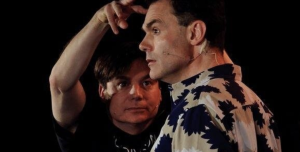
For the past hour, TLNT and Neil Mullarkey (above), have been getting along like a house on fire.
Chatting about all things leadership, one quickly finds out Neil is a very avuncular sort of chap.
Not only is he generous with his time, he’s genuinely interested in ‘you’. That’s great, but it also explains why – for most of our call (and this has been niggling at the back of my mind), TLNT has been grappling with an embarrassing question – what exactly to label him as (sorry Neil, it’s a journalist habit).
You see, for many people, Neil is a comic. Most Sundays you’ll see the former Cambridge University Footlights president performing at the UK’s The Comedy Store Players – Europe’s top improv troupe.
He co-founded it with Wayne’s World and Austin Powers creator, Mike Myers (a friendship formed in the mid-80s that saw the pair create their own show at the famous Edinburgh Fringe).
Since then Neil has appeared in numerous stage shows, TV series, as both writer and performer, and in two of the Austin Powers films (famously returning Powers’ Swedish Penis Enlarger – see below – after he’s been defrosted and finds himself in the 1990s).


But while he might now argue this is very much in his past – it sort of continues to be his present; because Neil is now, what TLNT would describe him as a leadership guru; specializing specifically in the ‘power of improv’ – and how leaders need to be better at communicating with each other.
So much so, in fact, that for the past decade or more, he’s been carving out a niche as a former funny-man that now wants to be taken seriously. An MBA, and three books later certainly help.
His latest, ‘In The Moment’ was shortlisted for a 2024 Best Business Book award. So what’s the gig now? (so to speak)
“I try and tell people I’m a coach,” says Neil. “While I might also be known as a comic, what I’m not,” he argues, “is a custard pie sort of person – that annoying person who’s always trying for a gag. I’m not ‘always on’ as many comics are. What I do, however, is use it to lubricate my work. I prick pomposity. I want my work to be taken serious, because I’m serious about it.”
With global clients that include the likes of Google, EY, Deloitte, Vodafone, Accenture, Unilever (and others), Neil’s big pitch is that business leaders are ‘blockers’ to new ideas or concepts of conversations, but if they unleashed the skills that those who excel in improv have harnessed, a whole new level of collaboration and creativity can be released. It sounds intriguing.
Improv is not telling jokes
“Years ago, Mike [Myers] said something that’s long stuck with me,” reflects Neil. “Improv is not telling jokes; rather it’s about listening [Chicago-based social workers Neva Boyd and Viola Spolin first devised the concept in the 1940s to help build the social skills of immigrant children].
He says: “Improvisation is a mindset; a discipline that you learn. It’s ethos is more more about saying ‘yes, and…’ rather than ‘yes, but…’ – which is a subtle difference, but an important one. When a leader adopts ‘yes and…’ it’s about them saying they hear what someone else is saying, and they want to explore how they can build on it, and build a story together.”
In a nutshell, argues Neil, improv is a way of validating other people’s choices; it doesn’t deny their reality; and it helps people feel good about their contributions. It’s about removing the tendency to put up filters, and instead letting a scene build to see what emerges.
“Most organizations are good at doing the things they create, like creating meetings,” he says. “But when leaders often fail to recognize is that in these meetings, it’s not their job to dictate, but to curate ideas, and encourage people to speak up, and be the facilitator of suggestions. They need to better define the situation they’re in [the meeting] to know what they want to get from it.”
Being open to divergence
The joy, claims Neil, from running his improv-teaching sessions, is seeing the lightbulb moment when leaders value the possibilities that arise from being open to a divergence of ideas.
“People often ask me whether I’m dressing up the need for leaders simply to be better at listening,” he says. “The short answer is that leaders do need to be better at listening, but they need to be better at listening with ‘intent’. I call it being ‘intentive’ – intent that values other people’s contributions.”
To be intentive, Neil says leaders also need to adopt ‘plussing’ – that is getting into the habit of not critiquing someone’s views unless they have their own improvement that they can add. Better still, they need to present an offer back, or at least acknowledge someone’s point of view.
“Comedians use the concept ‘reincorporate’ – which is having a callback phrase, or an idea that can come back into a conversation at a later point – to move and reinforce a narrative. This is a skill leaders need too,” he says. “Just imagine how great that feeling is for employees, if a leader presents an idea which circles back to something they said earlier,” says Neil. “Employees think ‘my boss has listened to me; they’ve not just stuck to their script; they’ve been adaptive’.”
Neil says too many organizations create opportunities for people to converge without any planned outcomes – and so they tend to just be events for chewing the cud, where really, the leader chooses to be over-dominant.
“It’s a fact that leaders – in the first year of being leaders – have 29% more meetings than at any other time – but are they actually creating conditions for collaboration, or are they just announcement events?,” he muses. “Giving more time for actual conversation – rather than more time for meetings – is what I’m trying to educate leaders to think about,” he says.
The irony, argues Neil, is that my ‘letting go’ a bit, it’s leaders who will actually benefit as well, by being more confident about their own performance as a leader.
“A lot of executives carry a lot of ‘fear’ about how they perform as leaders. They worry about themselves, but actually most leaders merely have to make other people feel good,”he says. “Even those leaders who say they need to go into meetings with a plan can still benefit from improv,” adds Neil.
What HR leaders can learn
Like any great orator, Neil’s messages appear deceptively simple.
But make no mistake about it, he’s done his homework, studied his topic, and is passionate that this is no fad. His knowledge of other leadership gurus is impressive, and his library of great leadership tomes in his bookshelf behind him isn’t just there for show.
He concludes: “The complexities around leadership have so many parallels in the world of performance. Giving people an experience of uncertainty, but then showing them how they can capitalize on this and empower others around them can be revelatory to some. Next level leadership demands this. Employees demand this.”
To find out more about Neil, click here.
